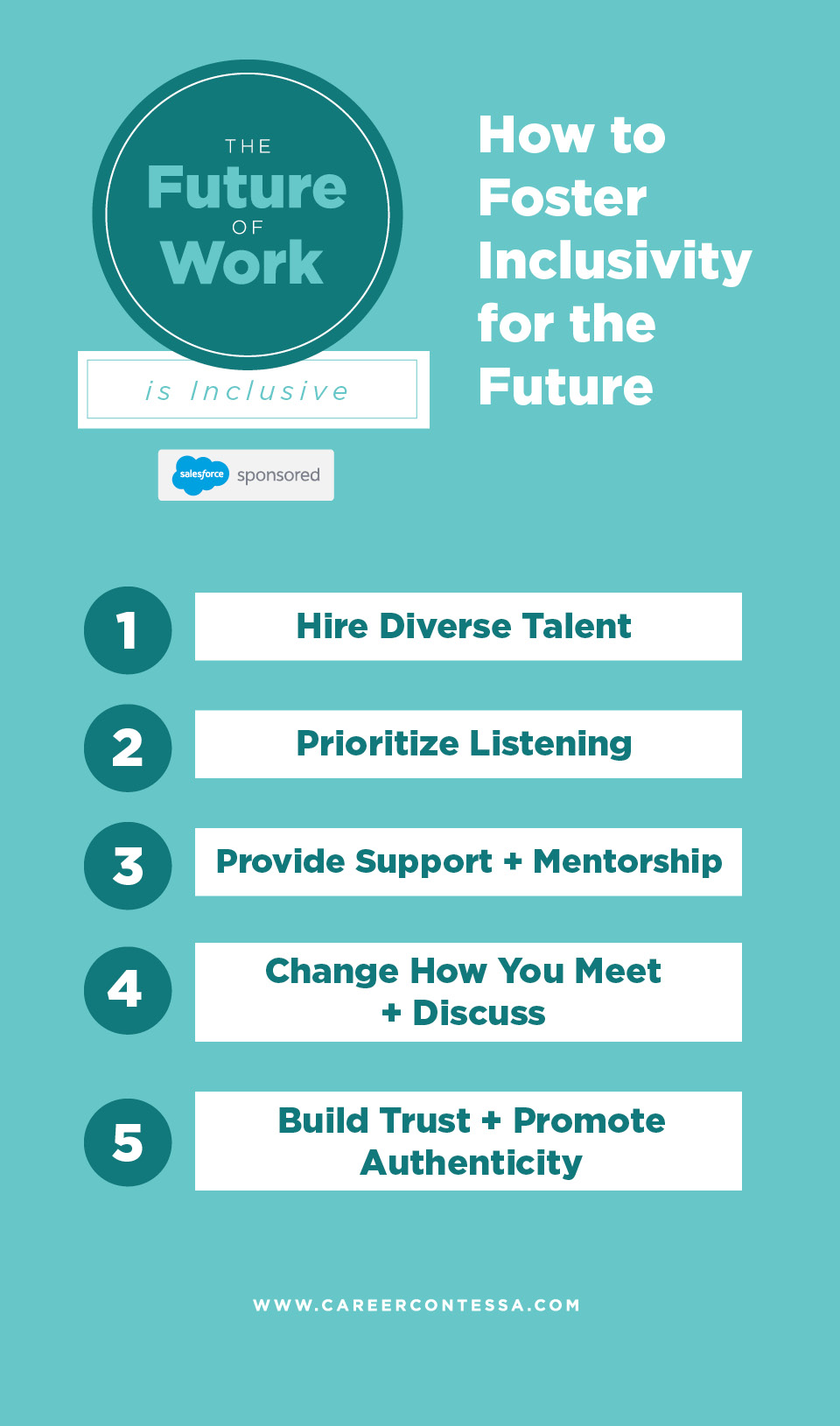The Future of Work series is sponsored by Salesforce.
Inclusivity is non-negotiable.
It's tough to grapple with the idea that hiring managers or companies still need to be convinced that hiring diverse talent is important. We know that citing a statistic proving inclusive teams outperform non-inclusive teams is important.
But it also feels like it's missing the mark. It’s like convincing people to do the right thing, for all the wrong reasons.
In the Career Contessa office, we brainstorm—a lot. A saying we've come to love to live by is that "more brains are better than one."
Our small editorial team can come up with article topics, sure—and based on our analytics, suggested article topics from readers, and our own original ideas, we can create a well-thought-out editorial calendar.
That content would probably perform just fine with our audience. But we've still got some major blind spots. If we add three more brains to the planning meeting—the brains of our brilliant coworkers who each have unique experiences and backgrounds, questions, and ideas—that content is undeniably better.
That's inclusivity. That's collaboration. That's diversity.
Frankly, without an inclusive, diverse workforce, you will not succeed. The future will leave you behind.
Inclusivity Versus Diversity
Inclusivity and diversity are often mentioned as if they are interchangeable—but they're separate concepts.
Inclusivity at work requires a diverse workforce—but goes a step further to ensure equal opportunities for all employees, regardless of their gender, sexual orientation, race, or religion. It's the embodiment of the idea that our differences make us stronger.
Inclusivity is deeper than hiring diverse talent. It's about fostering an environment where each employee feels like they can bring their whole selves to work. Where everyone feels heard. Where they feel motivated.
That's where innovation happens—in the office where brainstorms are true snowball sessions, where ideas, criticisms, and solutions flow freely, without personal attacks, condescending rebuttals, or microaggressions. Inclusivity is built on an underlying, undeniable sense of trust. Of respect.
It's not good enough to hire diverse talent, if those same hires don't feel like their suggestions are valued. If they don't feel like they can ask questions.
How to Foster Inclusivity For the Future
1. Hire Diverse Talent
This means people from all walks of life. With different experiences, strengths, and weaknesses. We've written on
how to overcome hiring bias—we're all biased inherently, but the key is to overcome them. Take an objective look at how your company hires—where can you improve?
Researchers found that blind hiring, for example, can increase the likelihood of hiring a woman by 25 to 46 percent. Other options for combating your hiring biases could be re-writing your job descriptions to include gender-neutral language or creating a standardized candidate rating system.
2. Prioritize Listening
Diverse talent becomes irrelevant if their ideas aren't being heard—if voices are muted, interrupted, or ignored. We can all work on our listening skills. Because most of the time, even if we think we're listening, we really aren't.
Active listening is a skill that boosts everyone's careers—and it fosters an environment where sharing ideas and cultivating dialogue is second nature. This is an easy opportunity for growth, that involves everyone on the team. Invite a speaker to walk your team through active listening, watch a YouTube video on it, or try our downloadable guide on being a better listener
right here.
3. Provide Support + Mentorship
The importance of mentorship in a person's career cannot be put into words.
Especially female mentorship. It's imperative for success, for fulfillment in a person's career, that they have a sponsor or a mentor—someone who has been where they've been, who is doing what they dream of doing one day.
Bottom line, it helps to not feel alone. For the moments of confusion, indecision, imposter syndrome, gaslighting—whatever it is, having a mentor or sponsor to help give advice or offer guidance is crucial. And on teams where employees may feel outnumbered or like they stand out, a mentor can serve as a reminder that they belong. If you're not sure where to start, try
starting a women's club at your workplace.
4. Change How You Meet + Discuss
We've touched before on the importance of presenting from the middle of the table, where it's easier for everyone to feel included in your conversation. Take the time to reflect on how you typically meet or share ideas.
Is it an environment that's conducive to conversation? Does everyone have a chance to be included, to be heard, to give feedback? If you sit at a table, do the people in higher/more executive positions typically sit at the "head" of the table? Does the bulk of the meeting happen there, too?
Try switching up the seating chart (heck, go old school alphabetical if you have to) to even out the playing field. Make sure everyone is given an opportunity to speak. More brains mean better ideas, remember?
5. Build Trust + Promote Authenticity
Growth often requires leaving your comfort zone. Uncomfortable conversations can lead to better teamwork if there's an underlying understanding of respect and trust. Coworkers must feel like they can say, "Hey, that was offensive, and this is why. Can we work to not have that happen again in the future?"
People in power, people in the majority,
they have to be the ones building this bridge. They have to be the ones that listen. Honest communication lies at the core of inclusivity. Those in power must become vulnerable, to ask—and hear—how they can grow, and how they can create a culture of trust in the workplace.
Do you want to play a role in the future of work? Check out open roles at Salesforce and learn all about their awesome company culture here.
The Future of Work series is sponsored by Salesforce.










